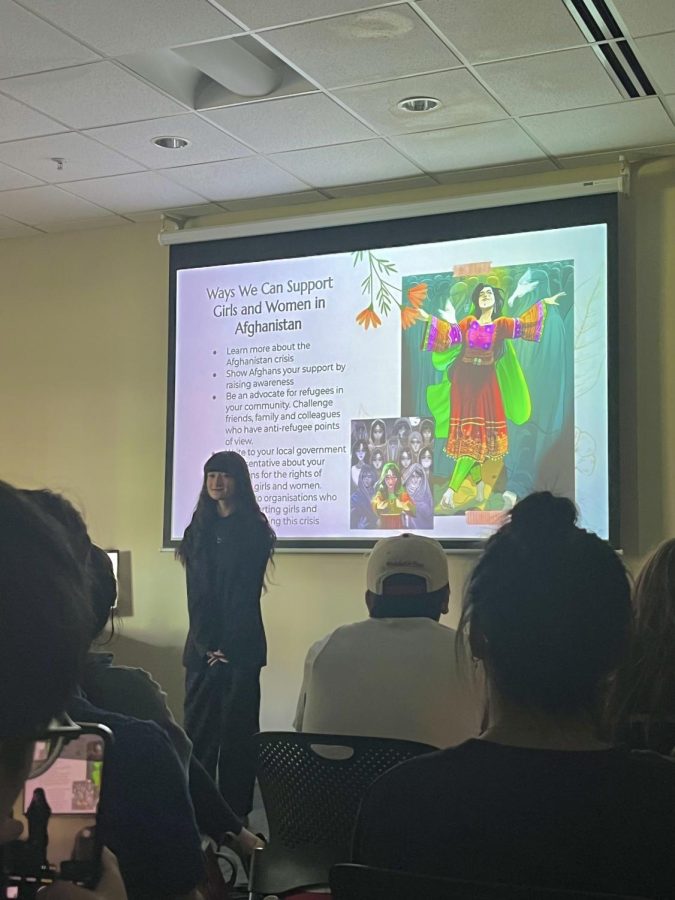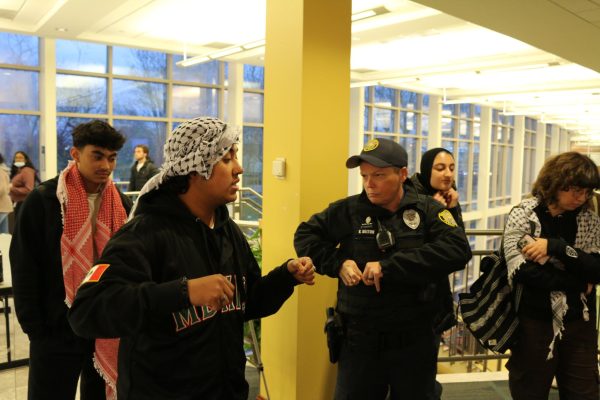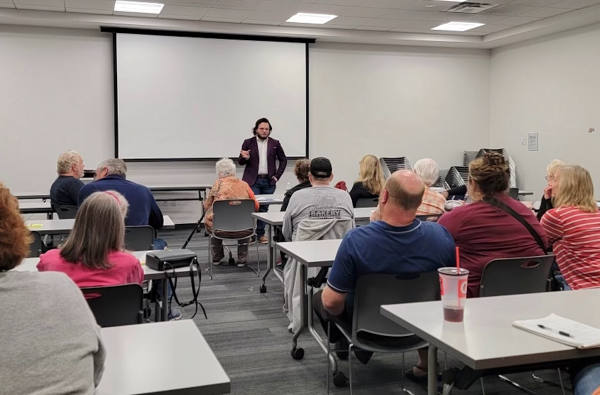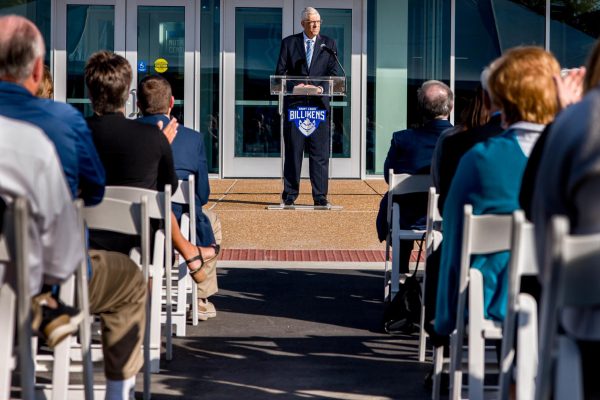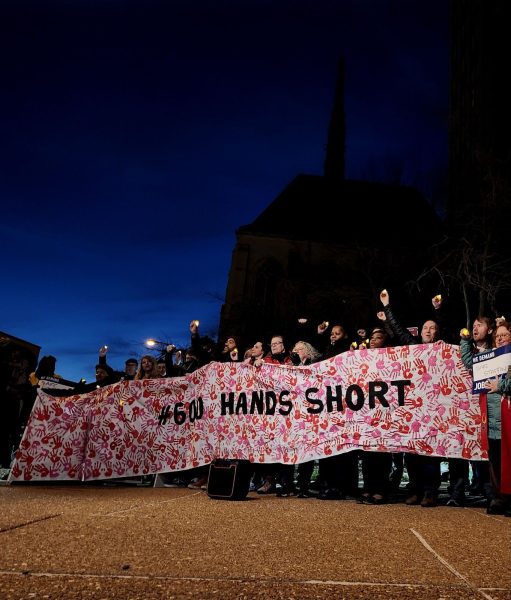Supporting Afghani Women Should be a Priority for All, Student Says in Atlas Week Event
“I wanted to start my own business in Afghanistan but now I can’t anymore because of the state of the country for women,” shared Sahar Hussaini at an Atlas Week event about Afghanistan.
Atlas Week at Saint Louis University was held from April 16 to April 23. During the week, students, faculty and staff from across the University organized events that highlighted global cultures and various issues people face across the world.
Hussaini, a freshman studying marketing, gave a keynote address on her journey coming to the United States as a refugee and the current situation of Afghani women. The talk, titled “What is happening to Afghan women”, was delivered in the Busch Student Center room 254 on April 18, 2023.
The room was dark with the only light coming from the screen showing the first slide of Hussaini’s presentation. Over 26 people came to hear her account. Hussaini started by going over the history of women’s rights in Afghanistan from 1964 to the 1990s and the changes because of the Taliban regime. Then, she discussed the state of women in Afghanistan today.
“Honor killings have been rampant since the 1990s and they are still prevalent in Afghanistan… From 2003- 2004, girls could go to school but they were not allowed to join sports or take leadership roles. However, today, girls are sent home by using force and by beating them. 1 in 3 women is forced to get married before they are 18 and no one can speak about it either. The Hazara people are targeted every second,” Hussaini said at the event.
Hussaini said she witnessed her classmates and friends getting shot in the school she used to go to. She saw her teacher, the person who used to encourage the students to dream, cease to exist. Now as a student in the United States, during the summer Hussani would hear people making traveling plans and when asked about hers, she would reply that she has to get the girls from Afghanistan connected to organizations and schools in other countries like Bangladesh so that they can receive the education they deserve.
Shandana Safari, a close friend of Hussaini, volunteered at the session to support her. A junior studying at SLU, Safari reflected on the different experiences that she and Hussaini had even though they both come from the Hazara community of Afghanistan. Safari’s family escaped to Pakistan and came to the United States in 2003. Their arrival was delayed due to 9/11 since they were supposed to come in 2001. She opened up about the Hazara genocide.
“Hazaras are going through an ongoing genocide as we speak. They’re the most targeted by the Taliban and have been fleeing the country since the 1900s. The Taliban has killed more than 70% of the population since the rule of Abdur Rahaman Khan,” Safari said.
Shubhi Ahluwalia, a senior studying finance, also came to the session to support Hussaini. She reflected that it is important for people to step out of their comfort zone to understand the issues that do not pertain to their immediate surroundings. Once you do that, she said, you get to learn things that move you. She also advised the SLU community to come to
support talks and meetings of similar nature.
“I would say come to events like this one and talk about it with your friends. I talked to my friends about this session because Sahar opened my eyes to her and other women’s stories,” Ahluwalia said.
“If you talk to your roommate about an event, they will talk to someone else. That’s how we can spread the word.”
Katrina Churchill, a freshman studying international business and economics, knew Sahar from shared classes. She said that she always wants to support her friends so that they know their stories are heard and accepted, especially when the stories are integral to them as individuals.
“It’s good to be aware of things outside of the bubble of school. It’s good to be aware of how people live in different parts of the world. You can also learn how to support people by hearing first-hand accounts of those who have lived in those parts of the world,” Churchill said.
Safari also reflected on the ways students specifically and Americans in general can help the Hazaras.
“I believe that people can help the Hazaras by listening to them, giving them a platform and spreading as much awareness for it as possible,” Safari said.
“They [the United States of America officials] could sponsor Hazara families to come to the US. They could donate to the Hazara Foundation that builds schools and helps families of the victims in the attack.”
A city with a sizable and ever increasing Afghani population, there are various resources that work to support Afghani newcomers. Hussaini is an intern with the Afghan support program at the International Institute of St. Louis. Her work is dedicated to getting support back home in the form of educational opportunity funds, finding safe locations for refugees and immigrants and connecting people to the Afghan cause.
“Within the Afghan support program at the international institute, we have the Afghan Chamber of Commerce, the Afghan community center, and many other programs to help Afghan immigrants here at St. Louis,” she said.
She also gave recommendations on the small things the SLU community can do to spread the word about the Afghani situation.
“They [the SLU community] can support by raising awareness through social media, doing class projects, conducting research related to the topic, educating the students and implementing it in their education. Community service and volunteering for the organization that supports immigrants here can be another way. I also want them to support Afghan students at SLU to help create an Afghan students association,” Hussaini said.
She is working with other students to launch an Afghan students association in fall 2023 at SLU. This will be a big move, she said, towards raising awareness on the campus grounds and getting public support to help Afghani immigrants and those who dream of a life outside of shackles.
Hussaini’s presentation ended with a poignant question for the audience. “What makes you see the injustice that is happening to Afghan women and ignore it? What makes you see a post about Afghanistan on social media and just scroll through it without taking any action toward spreading awareness about it?” Hussaini said.
Your donation will support the student journalists of Saint Louis University. Your contribution will help us cover our annual website hosting costs.


